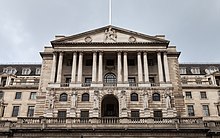
Back نظرية الدورة الاقتصادية الحقيقية Arabic Yeni iqtisadi-tsikl nəzəriyyəsi Azerbaijani Cicles econòmics reals Catalan Theorie realer Konjunkturzyklen German نظریه چرخه واقعی کسبوکار Persian Théorie des cycles réels French リアルビジネスサイクル理論 Japanese 실물적 경기순환이론 Korean Теорија на реални бизнис-циклуси Macedonian Reële businesscycletheorie Dutch
| Part of a series on |
| Macroeconomics |
|---|
 |
Real business-cycle theory (RBC theory) is a class of new classical macroeconomics models in which business-cycle fluctuations are accounted for by real (in contrast to nominal) shocks.[1] Unlike other leading theories of the business cycle,[citation needed] RBC theory sees business cycle fluctuations as the efficient response to exogenous changes in the real economic environment. That is, the level of national output necessarily maximizes expected utility, and governments should therefore concentrate on long-run structural policy changes and not intervene through discretionary fiscal or monetary policy designed to actively smooth out economic short-term fluctuations.
According to RBC theory, business cycles are therefore "real" in that they do not represent a failure of markets to clear but rather reflect the most efficient possible operation of the economy, given the structure of the economy.
RBC theory is associated with freshwater economics (the Chicago School of Economics in the neoclassical tradition).
- ^ Helgadóttir, Oddný (2021). "How to make a super-model: professional incentives and the birth of contemporary macroeconomics". Review of International Political Economy. 30: 252–280. doi:10.1080/09692290.2021.1997786. ISSN 0969-2290. S2CID 243791839.
© MMXXIII Rich X Search. We shall prevail. All rights reserved. Rich X Search